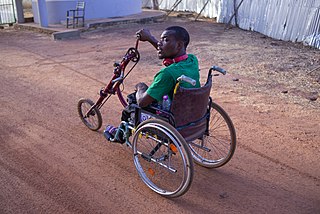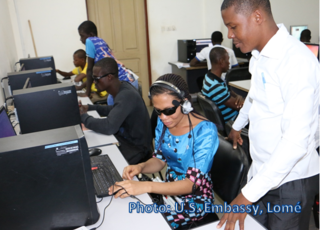Related Research Articles
A mental disorder, also referred to as a mental illness or psychiatric disorder, is a behavioral or mental pattern that causes significant distress or impairment of personal functioning. A mental disorder is also characterized by a clinically significant disturbance in an individual's cognition, emotional regulation, or behavior. It is usually associated with distress or impairment in important areas of functioning. There are many different types of mental disorders. Mental disorders may also be referred to as mental health conditions. Such features may be persistent, relapsing and remitting, or occur as single episodes. Many disorders have been described, with signs and symptoms that vary widely between specific disorders. Such disorders may be diagnosed by a mental health professional, usually a clinical psychologist or psychiatrist.

Ghana is a country of 28.21 million people and many native groups, such as:

Mental health encompasses emotional, psychological, and social well-being, influencing cognition, perception, and behavior. According to World Health Organization (WHO), it is a "state of well-being in which the individual realizes his or her abilities, can cope with the normal stresses of life, can work productively and fruitfully, and can contribute to his or her community". It likewise determines how an individual handles stress, interpersonal relationships, and decision-making. Mental health includes subjective well-being, perceived self-efficacy, autonomy, competence, intergenerational dependence, and self-actualization of one's intellectual and emotional potential, among others. From the perspectives of positive psychology or holism, mental health may include an individual's ability to enjoy life and to create a balance between life activities and efforts to achieve psychological resilience. Cultural differences, subjective assessments, and competing professional theories all affect how one defines "mental health". Some early signs related to mental health difficulties are sleep irritation, lack of energy, lack of appetite, and thinking of harming oneself or others.It also inculde's self-isolating and frequently zoning out,
Psychiatric nursing or mental health nursing is the appointed position of a nurse that specialises in mental health, and cares for people of all ages experiencing mental illnesses or distress. These include: neurodevelopmental disorders, schizophrenia, schizoaffective disorder, mood disorders, addiction, anxiety disorders, personality disorders, eating disorders, suicidal thoughts, psychosis, paranoia, and self-harm.
Involuntary treatment refers to medical treatment undertaken without the consent of the person being treated. Involuntary treatment is permitted by law in some countries when overseen by the judiciary through court orders; other countries defer directly to the medical opinions of doctors.

Robert Whitaker is an American journalist and author, writing primarily about medicine, science, and history. He is the author of five books, three of which cover the history or practice of modern psychiatry. He has won numerous awards for science writing, and in 1998 he was part of a team writing for the Boston Globe that was shortlisted for the 1999 Pulitzer Prize for Public Service for a series of articles questioning the ethics of psychiatric research in which unsuspecting patients were given drugs expected to heighten their psychosis. He is the founder and publisher of Mad in America, a webzine critical of the modern psychiatric establishment.

Deinstitutionalisation is the process of replacing long-stay psychiatric hospitals with less isolated community mental health services for those diagnosed with a mental disorder or developmental disability. In the late 20th century, it led to the closure of many psychiatric hospitals, as patients were increasingly cared for at home, in halfway houses and clinics, in regular hospitals, or not at all.

Georgia's state mental asylum located in Milledgeville, Georgia, now known as the Central State Hospital (CSH), has been the state's largest facility for treatment of mental illness and developmental disabilities. In continuous operation since accepting its first patient in December 1842, the hospital was founded as the Georgia State Lunatic, Idiot, and Epileptic Asylum, and was also known as the Georgia State Sanitarium and Milledgeville State Hospital during its long history. By the 1960s the facility had grown into the largest mental hospital in the world. Its landmark Powell Building and the vast, abandoned 1929 Jones Building stand among some 200 buildings on two thousand acres that once housed nearly 12,000 patients.
End-of-life care refers to health care provided in the time leading up to a person's death. End-of-life care can be provided in the hours, days, or months before a person dies and encompasses care and support for a person's mental and emotional needs, physical comfort, spiritual needs, and practical tasks.

Islamic psychology or ʿilm al-nafs, the science of the nafs, is the medical and philosophical study of the psyche from an Islamic perspective and addresses topics in psychology, neuroscience, philosophy of mind, and psychiatry as well as psychosomatic medicine. In Islam, mental health and mental illness were viewed with a holistic approach. This approach emphasized the mutual connection between maintaining adequate mental wellbeing and good physical health in an individual. People who practice Islam thought it was necessary to maintain positive mental health in order to partake in prayer and other religious obligations.

Christianity is the largest religion in Ghana, with 71.3% of the population being member of various Christian denominations as of 2021 census. Islam is practised by 19.9% of the total population. According to a 2012 report by Pew Research, 51% of Muslims are followers of Sunni Islam, while approximately 16% belong to the Ahmadiyya movement and around 8% identify with Shia Islam, while the remainder are non-denominational Muslims.
Psychiatry is the medical specialty devoted to the diagnosis, prevention, and treatment of deleterious mental conditions. These include various matters related to mood, behaviour, cognition, and perceptions.

Euthanasia in Canada in its legal voluntary form is called medical assistance in dying (MAiD) and it first became legal along with assisted suicide in June 2016 to allow terminally ill adults to control their deaths. In March 2021, the law was further amended by Bill C-7 which permits assisted euthanasia in additional situations, including for people with disabilities and chronic diseases. In 2021, more than 10,000 people died by euthanasia in Canada.
Navajo medicine covers a range of traditional healing practices of the Indigenous American Navajo people. It dates back thousands of years as many Navajo people have relied on traditional medicinal practices as their primary source of healing. However, modern day residents within the Navajo Nation have incorporated contemporary medicine into their society with the establishment of Western hospitals and clinics on the reservation over the last century.

Witch camps are settlements where women in Ghana who have been accused of being witches can flee for safety. Women in such camps have been accused of witchcraft for various reasons, including mental illness. Some camps are thought to have been created in the early 20th century. The Ghanaian government has enacted measures to eliminate such camps.

Disability in Ghana has a massive amount of stigma; children or people who are born disabled or deformed are assumed to be possessed by evil spirits.

Cinema of Ghana also known as the Ghana Film Industry nicknamed Ghallywood, began when early film making was first introduced to the British colony of Gold Coast in 1923. At the time only affluent people could see the films, especially the colonial master of Gold Coast. In the 1950s, film making in Ghana began to increase. Cinemas were the primary venue for watching films until home video became more popular. The movie industry has no official name as yet since consultations and engagements with stakeholders has been ongoing when a petition was sent to the Ministry of Tourism, Arts and Culture which suspended the use of the name Black Star Films.

People with disabilities in Togo face many unique challenges. Disability in Togo is often seen as a curse or sign of witchcraft, leading to poor outcomes for people with disabilities. Accessibility in the country is lacking. However, Togo has signed onto the UN Convention on the Rights of Persons with Disabilities and has created plans to encourage greater inclusion for people with disabilities in the country.
Ama Hemmah (1947–2010) was a Ghanaian woman who was burned to death on suspicion of being a witch.
Witchcraft is deeply rooted in many African countries and communities in Sub-Saharan Africa. It has been specifically relevant to Ghana's culture, beliefs, and lifestyle. It continues to shape lives daily and with that it has promoted tradition, fear, violence, and spiritual beliefs. The perceptions on witchcraft change from region to region within Ghana, as well as in other countries in Africa. The commonality is that it is not something to take lightly, and the word spreads fast if there are rumors' surrounding civilians practicing it. The actions taken by local citizens and the government towards witchcraft and violence related to it have also varied within regions in Ghana. Traditional African religions have depicted the universe as a multitude of spirits that are able to be used for good or evil through religion.
References
- ↑ "The (In)human Dimension of Ghana's Prayer Camps". Human rights watch . Retrieved 2015-02-20.
- ↑ "Prayer camps chain mentally ill". BBC. Retrieved 2015-02-20.
- ↑ "Ghana's prayer camps: where the mentally ill are chained, starved and abused". Toronto Star . Retrieved 2015-02-20.
- ↑ Mensah Adinkrah (2015-08-15). Witchcraft, Witches, and Violence in Ghana. p. 22. ISBN 9781782385615 . Retrieved 2016-04-09.
- ↑ Carey, Benedict (11 October 2015). "The Chains of Mental Illness in West Africa". New York Times. Retrieved 2018-07-29.
- ↑ Mensah Adinkrah (2015-08-15). Witchcraft, Witches, and Violence in Ghana. p. 22. ISBN 9781782385615 . Retrieved 2016-04-09.
- ↑ Vivian E D Ampadu. "The Depiction of Mental Illness in Nigerian and Ghanaian movies: A negative or positive impact on mental health awareness in Ghana" (PDF). Disability-studies.leeds.ac.uk. Archived from the original (PDF) on 2017-01-11. Retrieved 2016-09-15.
- ↑ Edwards, Jocelyn (January 2014). "Ghana's mental health patients confined to prayer camps". The Lancet. 383 (9911): 15–16. doi: 10.1016/S0140-6736(13)62717-8 . ISSN 0140-6736. PMID 24400332. S2CID 41728845.
- ↑ "Ghana Breaks The Chains On Mental Health". Human Rights Watch. 2017-10-16. Retrieved 2018-05-09.
- ↑ Arias D, Taylor L, Ofori-Atta A, Bradley EH (2016) Prayer Camps and Biomedical Care in Ghana: Is Collaboration in Mental Health Care Possible? PLoS ONE 11(9): e0162305. doi:10.1371/journal.pone.0162305